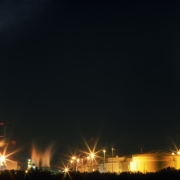Is LNG – or is it not – a commodity?
To those outside the nebulous Natural Gas world, LNG is the stuff that evokes phantasies of miracle trades and fast riches. LNG has been dubbed a commodity many times over the last 10 years alone. But is the status deserved? A demystification.
What is a commodity? Stuff, that someone wants to sell and someone else wants to buy. Wait a minute, a real trader would reply. There is more to a real tradable commodity than meets the eye. We need markets, we need liquidity, we need platforms, we need standardized contracts, yadda yadda, yadda. All true! When it comes to determining if LNG is a commodity, simpler measuring sticks should be applied.
This is for the non-traders: energy trade floors are roughly divided into desk traders (the real traders) on the one side and those doing the complex deals (the originators) on the other.
Desk Traders are the screen addicts as depicted in “Wall Street” like movies. In the real world, they are rational observers of the market and they conduct deals according to their analysis and the rules of the floor they work on. That’s the theory at least.
An originator’s world is opaque and complex in comparison. Their job is to improve on the mid-and long-term portfolio of sources, capacities, and even outlets the company holds on to. Hardly any real trading activity is detectable.
A purified trade floor does not need any originators as a pure trade floor would not mess with complicated portfolios, to begin with. But in energy, things are rarely pure and never easy.
Perfect markets (as defined by liquidity) don’t need originators so the complex deal of the originator becomes necessary when a market is imperfect (don’t forget, perfection as defined by liquidity). The originator is needed when there is no market to speak of, or at least not a market as a desk trader would understand it.
But what is all that gobbledygook? Don’t I have a market if there is someone, who wants to sell and someone else, who wants to buy? In a sense, that is some kind of market. But we want to know if LNG is a commodity (as a trader would understand it) and therefore we can not apply the rules of – let’s say – Egyptian camel herdersLet’s
It applies a much simpler test. Assume that you own a crude oil cargo. You know, one of those regular cargos. 2 million barrels of black stuff in a petroleum tank. The tanker has a loading slot in 10 days at the Bonny terminal and the onshore tank holding the crude has been pinged. Great. Now you have the quantity, a spec sheet, a location, and the name of a vessel. All you need to know is to make commercial sense of the cargo. How would you know what you own?
Easy, you would retort. With all that information you determine what kind of crude you have got in your cargo hold and then it’s as simple as applying the appropriate price marker. That means that at any moment, no matter where your cargo is situated and no matter what quality you have gotten, you will be able to determine a pretty exact price for which there will always be someone who buys.
Physical cargos change owners a couple of times while on the water. It’s a lively trade.
Let’s do the same thing for LNG now. Assume that you have received a cargo of LNG as a reward for something great that you have done for a seller. The producer/seller not only grants you ownership of the LNG itself, he also arranges an LNG vessel to pick it up (real LNG life is not that easy but Christmas is not too far and I am still using my soft gloves). Now your cargo is scheduled to load and all is set. How would you determine what you own now?
You got the spec sheet so now you know exactly what kind of LNG you have and the cargo docs. In theory, this should be easy but when you look for the right price marker, there is already a problem. What do you use?
Henry Hub, NBP, and TTF (and their brethren) are gas price markers. Not made for LNG and is not applicable. Those prices are regional in nature and respond to regional developments in pipeline gas (in part at least but that’s a complicated topic). Formulas are designed for long-term supply lines where the parties control the liquefaction, transport, and landing capacities. Not for spot cargo and hence not applicable as well.
LNG prices – to this very day – are artifices and work only between the parties of a deal and only for that particular deal. So you are stuck.
Let’s assume for a moment that there would be an LNG price marker (there isn’t but I wave my magic wand for a moment). Would it work then?
Well, if you want to know what your cargo is worth, you must find out what someone else is willing to pay for it. In crude (again) this is simple if you apply the accepted transparent and liquid price markers, there is always a willing buyer (that’s why it’s liquid and hence a commodity). In LNG you may apply whatever price you wish – as long as no market will always produce a buyer at this particular price – you may as well apply the price of pulverized toad warts. It’s a worthless exercise.
The reason is lacking overcapacity. Crude and any other commodity are tradable because there is huge overcapacity in any segment of the chain backing the trade up. You would always be able to close your position – come what may.
You may lose a spread on a cargo but you never lose the cargo itself. On a 2 million barrel cargo that’s a couple of millions worst case. In LNG you may lose the cargo. It’s boiling liquid. Park it on the ocean long enough and at some moment it will be gone. Simply evaporated into nothingness. The only way to get rid of a distressed cargo of LNG is to dump it into a sink market and the only safe one is the US. Imagine you bought 4 million mmBtu’s on 14 USD and have to dump it for 3 USD. That’s a huge hit. Won’t happen in crude.
Conclusion: if you buy spot LNG you better be sure that you either have a sufficiently highly priced and performing sink position or the deal is done back to back. But that automatically denies LNG commodity status. And will continue to do so for a little while longer.
Does that mean, traders new to LNG should stay away from it altogether? If they think it’s just one more commodity then YES, absolutely. Run, and never look back.
If on the other side, the trader is ready to acknowledge the particular nature of LNG, gets real LNG battlefield-hardened firepower, spends time and money on developing long-term relationships and most of all is ready for the weird world of LNG, then welcome.
But be careful – you might get addicted. I sure did.


















Leave a Reply
Want to join the discussion?Feel free to contribute!